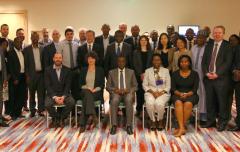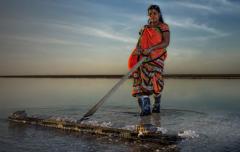Sustainable energy efforts growing in Africa
Lisbon, Portugal – While financing continues to be a major hurdle, momentum in many African countries to advance their energy access goals is clearly a priority. That was the clear takeaway of an all-day SEforALL Africa Workshop – organized by the African Development Bank, the SEforALL Africa Hub and other groups – last Friday in Lisbon.
The gathering was among more than a dozen Partner associated meetings held in the wake of the Sustainable Energy for All Forum, which ended Thursday.
Access, clean cooking and renewables
In wide-ranging discussions covering Sustainable Development Goal 7 (SDG7) and finance flows and country-specific investment plans, governments expressed unprecedented support for programs and targets that will accelerate electricity access, clean cooking access and renewable energy use. There were also separate discussions on SDG7-related investment opportunities in Somalia and Guinea Bissau.
Among the highlights was a new action plan outlined by the Rwandan government to provide access to clean fuels and cooking solutions to 47% of the population by 2024, significantly reducing the percentage of its population cooking with traditional biomass and addressing the associated health impacts and deforestation.
Rwanda also has aggressive goals to boost electricity access in rural areas, primarily by relying on off-grid solar. Meanwhile, Somalian officials outlined how the country is open for business to clean energy companies, while a Nigerian senior official touted the recent approval of $75 million of solar project financing – a direct result, he said, of having an action agenda and an investment plan outlining the country’s electricity access objectives.
Lacking financing
These efforts are encouraging, but they are only baby steps in the colossal challenge of achieving universal sustainable energy access across Africa by 2030, as set out in SDG7. Almost 600 million people in Sub-Saharan Africa still lack access to electricity, according to new SDG7 data released at the SEforALL Forum last week; more than 860 million people in the region lack access to clean cooking.
Rachel Kyte, Special Representative of the UN Secretary-General and Chief Executive Officer for Sustainable Energy for All (SEforALL), said the biggest challenge is the lack of financing for energy access projects and enterprises.
“We have (government) ministers standing up with new plans and ambitious (energy access) targets, but finance is behind the curve,” said Kyte in opening remarks at the Africa workshop. She was especially tough on the development finance community whose efforts she described as “weak” and “too conservative.”
Sam Parker, director of the Shell Foundation, echoed the sentiment, noting a huge gap in “bridge financing” for off-grid enterprises operating in Africa.
Putting IPs in place
Much of Friday’s discussion focused on the SEforALL Africa Hub’s strategy of supporting countries in developing formal Action Agendas and Investment Prospectuses (IPs) outlining their sustainable energy goals and related investment opportunities. Nigeria, Kenya and a half-dozen countries have approved IPs in place and a dozen other countries are working on them.
Faruk Yabo, Acting Director, Renewable Energy and Rural Power Access of Nigeria’s Ministry of Power, said the IPs play an important role and were very helpful in securing the $75 million financing commitment that will help build a 15-megawatt solar plant and a dozen smaller mini-grid systems. “The whole SEforALL IP process must be commended,” Yabo said.
Rwanda’s government expects to finalize its first IP later this year that will have a big focus on its clean cooking access plan.
Other speakers noted that IPs were only one piece of the puzzle for investors.
“All too often, IPs are more a big wish list of things,” said Alexia Kelly, CEO of Electric Capital Management and the Microgrid Investment Accelerator, adding, “IPs are also only as good as the underlying (government) policies behind them.”
Renewables strengthen security
Transforming the energy system in Somalia – where only 15 percent of the population has access to electricity and just 2 percent have access to clean cooking– was another big focus on Friday. The government is fully committed to sustainable energy, and is encouraging private sector investment to support it.
“Renewable energy can provide a pathway forward in creating economic opportunities and strengthening security,” said Michael Keating, Special Representative of the UN Secretary-General in Somalia and a key catalyst for Friday’s meeting.
Several businesses attended the meeting, all of them small in size but brimming with enthusiasm. One of the companies, SolarGen Technologies, has sold more than 100 solar-powered water irrigation pumps to Somalian farmers and is now installing two solar mini grids in communities north of the capital of Mogadishu.
Another company, Power OffGrid, is selling biomass cookstoves, using food and animal waste as fuel, and small solar systems. Befitting a country where per capita incomes are only a few hundred dollars a year, payments come in many forms. One popular form of down-payments is the exchange of goats.
We don’t want to limit ourselves. We want people to have options,” said Guled Ahmed, CEO of Power OffGrid.
Videos and Pictures




